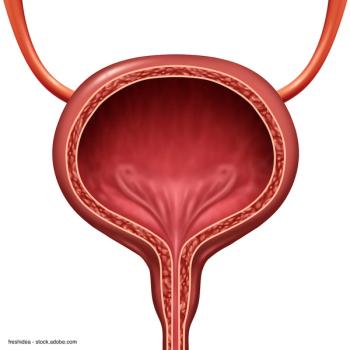
The new drug application for 18F-DCFPyL is supported by results from the OSPREY and CONDOR trials.

The new drug application for 18F-DCFPyL is supported by results from the OSPREY and CONDOR trials.

“Although IPSS may not be familiar to gynecologists and urogynecologists, this minimally invasive self-reported questionnaire is useful in counseling preoperative pelvic organ prolapse patients with OAB symptoms," researchers write.

Treatment with litoxetine, an investigational oral selective serotonin reuptake inhibitor, led to nearly 22% of patients becoming continent.

Retreatment rates were low with both aquablation and transurethral resection of the prostate.

The EUPROMS patient-driven quality-of-life study included data from almost 3000 men treated for prostate cancer.

The phase 3 CONDOR study demonstrated excellent diagnostic performance with 18F-DCFPyL–PET/CT in men with biochemically relapsed prostate cancer, even at very low PSA values.

The benefits of minimally invasive water vapor thermal therapy (Rezūm System) on lower urinary tract symptoms due to benign prostatic hyperplasia are durable, with a reduction in symptom score and an improvement in flow rate sustained to 5 years, according to researchers.

Disease progression within 6 months was the strongest surrogate marker for overall survival in patients with metastatic hormone-sensitive prostate cancer treated with combination therapy in a retrospective analysis of the CHAARTED trial.

Compared with local radiation therapy, radical prostatectomy as primary treatment for prostate cancer may result in a lower risk of castration-resistant disease and superior overall survival from the time of metastasis.

Durvalumab (IMFINZI) appears to be feasible as neoadjuvant therapy with preliminary evidence of antitumor activity in patients with muscle-invasive bladder cancer who are ineligible for cisplatin-based chemotherapy.

High-grade nonmuscle-invasive bladder cancer is characterized by high rates of disease progression following introduction of bladder-preservation therapy after treatment with Bacillus Calmette-Guérin.

“Histologic subtype shouldn’t exclude patients from getting checkpoint inhibitor therapy,” says Natalie J. Miller, MD, PhD.

The PARP inhibitor olaparib significantly extended radiographic progression-free survival compared with physician’s choice of hormonal therapy in men with metastatic castration-resistant prostate cancer who had defects in genes involved in DNA repair mechanisms.

The first long-term study of an implantable electrode for tibial stimulation to treat overactive bladder shows a sustained high responder rate and a clean safety profile, said Roger R. Dmochowski, MD, at the AUA annual meeting in Chicago.

Treatment for overactive bladder (OAB) improves OAB symptoms similarly in frail and nonfrail older patients with no difference in side effects, according to a multi-institutional study presented at the AUA annual meeting in Chicago.

Adding immunotherapy in the form of atezolizumab (Tecentriq) to platinum-based chemotherapy extends progression-free survival compared with chemotherapy alone in patients with previously untreated metastatic urothelial carcinoma, according to results from a phase III study.

Androgen deprivation therapy for advanced prostate cancer may increase the likelihood of urethral atrophy in men with an artificial urinary sphincter (AUS), thereby contributing to an increased risk of AUS cuff erosion.

On the basis of findings from the KEYNOTE-426 study, the combination of pembrolizumab (KEYTRUDA) plus axitinib (Inlyta) represents a new standard as front-line treatment for metastatic clear cell renal cell carcinoma, said Thomas Powles, MD.

Integration of tumor genetic testing and genomically-informed therapies into clinical practice for patients with advanced prostate cancer are featured in updated National Comprehensive Cancer Network guidelines on the management of prostate cancer (version 2.2019).

Alterations in DNA damage response genes, excluding ATM, correlate with improved outcomes in relapsed/advanced urothelial cancer.

Radiation is a well-tolerated and effective salvage option following primary high-intensity focal ultrasound for the treatment of localized prostate cancer, according to findings from a single-institution retrospective analysis.

About one in five patients with familial urothelial carcinoma have pathogenic germline variants, according to an analysis of 79 such patients using germline multigene panel testing.

Researchers evaluated a retrospective cohort of 10 patients with 26 primary prostate tumors who underwent MRI prior to prostatectomy.

African-American men with metastatic castration-resistant prostate cancer who were treated with abiraterone acetate (ZYTIGA) or enzalutamide (XTANDI) and who had not received prior chemotherapy lived 20% longer over 5 years compared with their Caucasian counterparts.

Nearly 90% of men with hormone-sensitive prostate cancer (HSPC) who initiate androgen deprivation therapy (ADT) have at least one bone metabolism biomarker that is elevated.

Inflammatory bowel disease increases the risk of any and clinically significant prostate cancer, according to an examination of data from a large, single medical network.

Cabozantinib (Cabometyx) demonstrated consistent improvement in progression-free survival and overall survival (OS) over everolimus (Afinitor) and sunitinib (Sutent), irrespective of PD-L1 status, across two randomized controlled clinical trials in patients with metastatic clear cell renal cell carcinoma.

Among the treatment options for intermediate-risk prostate cancer, brachytherapy is associated with the lowest 10-year rate of severe urinary complications while radical prostatectomy most often resulted in the use of devices to treat erectile dysfunction, according to findings from a retrospective analysis of patients who underwent treatment between 2004 and 2007.

Active surveillance rates among African-American men with low-risk prostate cancer tripled over a 5-year period in the United States beginning in 2010, which suggests that AS is viewed as a safe management option regardless of race.

Enzalutamide (XTANDI) added to androgen deprivation therapy significantly extended radiographic progression-free survival compared with ADT alone in a phase III study of men with metastatic hormone-sensitive prostate cancer.

Published: July 23rd 2020 | Updated:

Published: July 22nd 2020 | Updated:

Published: September 16th 2020 | Updated:

Published: July 21st 2020 | Updated:

Published: July 15th 2020 | Updated:

Published: May 10th 2018 | Updated: